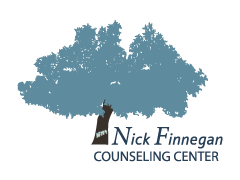
Todd Greenwalt
Tell us your NFCC Story…
I was invited to be on the Discipleship Committee at St. Luke’s United Methodist Church, approximately 15 years ago. The Committee oversaw various ministries of the church, including the Nick Finnegan Counseling Center. Shortly after I was invited to be on the Committee, I was asked to serve as the Committee Chair. One of the responsibilities that accompanied being the Chair was being an NFCC Advisory Board member. I was generally familiar with NFCC and excited about serving on the Advisory Board, especially since Bill Finnegan, Nick’s dad, and I had been colleagues at Vinson & Elkins. As an Advisory Board member, I was given the opportunity to learn about NFCC in depth. In my law practice, I work with a number of healthcare clients, so I know that mental and behavioral health experiences a constant shortage of providers. I was amazed at NFCC’s commitment to address that shortage as reflected in the rapid rise in NFCC counseling sessions. Moreover, being involved with NFCC has given me the opportunity to get involved in helping to normalize and destigmatize mental health counseling. As such, it has been easy for me to stay involved and excited about NFCC.
You serve as the Chair of the Nick Finnegan Counseling Center Foundation Board of Directors. Why was The Foundation established and what is its role in NFCC’s operations?
One area of my legal practice is charitable organizations and that experience has been helpful in my role on the NFCC Advisory Board and, now, the Foundation Board. After several discussions with Mary Elizabeth Hand, the NFCC Executive Director, and others, it became clear that establishing the Foundation as a separate charitable organization dedicated to the support of NFCC would afford donors unable or unwilling to donate directly to a religious organization, e.g., St. Luke’s, the ability to directly support NFCC by donating to the Foundation. Prior to the establishment of the Foundation, NFCC was encountering challenges with some grant applications. For example, many organizations have adopted online grant application processes that require applicants to identify what “type” of organization they are by choosing from a list provided in the application. NFCC, even though it views itself as a healthcare organization, is a ministry of St. Luke’s and, as such, is frequently required to identify as a religious organization. The Foundation, which is an entity separate from the church, does not face that dilemma, and can identify as an organization that supports the provision of mental health services. In this way, the Foundation connects NFCC to organizations that want to support counseling and mental health services, but are unable or unwilling to give directly to a religious organization.
Which one of NFCC’s success are you most proud of?
NFCC has had several impressive achievements over the past 15 years, including remarkable growth in the number of patients treated and counseling sessions provided and buildout of the physical space. However, in my view, the most impressive accomplishment is how nimbly NFCC adjusted to the COVID-19 pandemic, incorporating telehealth practices to provide uninterrupted client services when counselors couldn’t meet clients face-to-face. When you think about the intimate nature of counseling, it’s a different experience when you do it remotely. Nonetheless, NFCC was able to continue to serve clients through effective counseling services during the entire COVID-19 pandemic. I think that is, truly, nothing short of spectacular.
Why do you stay involved with NFCC? What do you hope to see NFCC accomplish in the future?
I stay involved for the same reasons that I initially became involved. I think mental health services are a vital component of the overall continuum of healthcare services in the community, and to be able to work with an organization that is providing those services—services that are in chronic short supply—is a worthwhile expenditure of my time. As a bonus, I have gotten to know Bill and Susan Finnegan better and it is a privilege to be involved in their journey.
As for future developments, I think it would be wonderful if NFCC had multiple counseling locations. We already provide services all over the Houston area, over 130 zip codes, and one could argue we already have multiple locations because of our partnership with Communities in Schools and our ability to send NFCC counselors to Houston area schools. However, I think multiple, dedicated counseling locations would be valuable for the community and expand NFCC’s reach. It would also be an indication of the strength of NFCC’s program and the commitment of its supporters.
